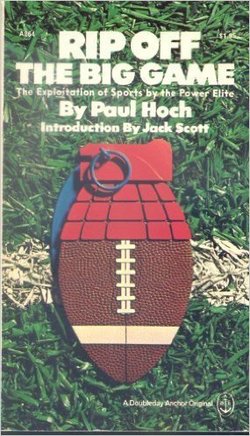Photo courtesy Associated Press / Published in USA Today
COURSE OVERVIEW
This 15-week course will concentrate on the interdependent connections between sport and media with a special focus on the effect of capitalism on those relationships.
OBJECTIVES
At the conclusion of this course, the assigned readings, class discussions and completed assignments should have helped you to:
· Develop and improve critical-thinking skills, specifically in the sport media arena
· Gain a cultural and economic sensitivity surrounding such issues
· Navigate the complex, capitalist landscape to identify story ideas and bring those ideas to production/publication
· Develop and improve critical-thinking skills, specifically in the sport media arena
· Gain a cultural and economic sensitivity surrounding such issues
· Navigate the complex, capitalist landscape to identify story ideas and bring those ideas to production/publication
REQUIRED TEXTS

CAPITALISM: A VERY SHORT INTRODUCTION
By James Fulcher Amazon.com Review: "This Introduction explores the origins of capitalism... The book discusses the crisis tendencies of capitalism -- including the S.E. Asian banking crisis and the 1997-1998 global financial crisis -- and asks whether capitalism is doomed to fail. The author ruminates on a possible alternative to capitalism, discussing socialism, communal and cooperative experiments, and alternatives proposed by environmentalists." |

NOTE: THIS BOOK IS CURRENTLY OUT OF PRINT; MOLLY WILL SUPPLY IT!
RIP OFF THE BIG GAME: THE EXPLOITATION OF SPORTS BY THE POWER ELITE By Paul Hoch Amazon.com Review: A vintage (1970) expose - "a hard-hitting, radical, controversial, critical analysis of the Sports Establishment, and the power elite behind it." Professor Review: "This old book will begin to open your eyes to the control mechanisms in place in your favorite games that are designed to keep you coming back for more. You will also begin to see how these mechanisms have evolved over time. " |

BAD SPORTS: HOW OWNERS ARE RUINING THE GAMES WE LOVE
By Dave Zirin
Amazon Review: "Funny, engaging, and sharply pointed in his appraisal of the sports complex bankrupting our cities, the celebrated author of A People’s History of Sports in the United States returns with a hard-hitting indictment of big business and the corrupt practices that are ruining the sports we love.
When attending a baseball game becomes a luxury reserved for the wealthy few and cities build multi-million dollar stadiums while letting their bridges crumble, the price of sports in this country demands reassessment. Bad Sports cuts through the hype and bombast to give us a portrait of sports ownership as irresponsible as the financial shenanigans that drove the nation to the edge of economic ruin. From the outrageous use of public funds for stadium construction to the use of these spaces for religious and political platforms, Dave Zirin raises vital questions about misplaced priorities and moral abdications among the politicians we elect and the owners of the teams we root for.
Speaking out in clear and passionate terms for the rights of any taxpayer and sports fan, Zirin returns America’s favorite pastimes back to where they belong—in the open & for the people."
By Dave Zirin
Amazon Review: "Funny, engaging, and sharply pointed in his appraisal of the sports complex bankrupting our cities, the celebrated author of A People’s History of Sports in the United States returns with a hard-hitting indictment of big business and the corrupt practices that are ruining the sports we love.
When attending a baseball game becomes a luxury reserved for the wealthy few and cities build multi-million dollar stadiums while letting their bridges crumble, the price of sports in this country demands reassessment. Bad Sports cuts through the hype and bombast to give us a portrait of sports ownership as irresponsible as the financial shenanigans that drove the nation to the edge of economic ruin. From the outrageous use of public funds for stadium construction to the use of these spaces for religious and political platforms, Dave Zirin raises vital questions about misplaced priorities and moral abdications among the politicians we elect and the owners of the teams we root for.
Speaking out in clear and passionate terms for the rights of any taxpayer and sports fan, Zirin returns America’s favorite pastimes back to where they belong—in the open & for the people."
** In addition to these books, you are required to read articles and book chapters posted in the "Schedule" section of this site.
COURSE POLICIES
ACADEMIC INTEGRITY
Familiarize yourself with Quinnipiac University's policy on Academic Integrity. (Available in full here.)
ASSISTANCE
If you have health and/or educational needs, please inform the professor within the first week of the semester. Even if you have already made arrangements with the Office of Academic Services, please make the professor aware within the first week of the semester.
Consistent with its responsibilities, Quinnipiac University provides reasonable accommodations to promote equal educational opportunity. The University provides staff members to ensure compliance with the ADA and Section 504. These staff members work directly with students, faculty and staff regarding reasonable accommodations and other assistance as needed. If you require assistance beyond what your professor can provide, please contact John Jarvis, Coordinator of Learning Services at 203-582-5390 or [email protected].
ATTENDANCE
Given that this is a senior-level seminar course, attendance is required. Missing more than one class will negatively impact your grade. Course withdrawal will be recommended if a student misses two or more classes regardless the reason.
CLASSROOM TECHNOLOGY
* See expectations under "CLASS ENGAGEMENT" on GRADES & RUBRIC page.
* Communication professionals don't use Blackboard, so we aren't going to, either, in this class. What do huge communication companies such as ESPN, or small newspapers like The Day in New London, Connecticut use? They use a messaging platform called SLACK. Therefore, we are going to use it, too.
Slack is free, and it's basically the same concept as instant messaging via your smartphone and computer.
Here's how you do it: I have sent you an invitation to join JRN450F16. Follow the directions in the invite. Be sure to download the app on both your laptop and your smartphone. You can send public and private messages to me, to any one in the class, to groups of students. It is the only way, aside from personal emails, that we will communicate for the class.
DEPARTMENT/UNIVERSITY LEARNING OUTCOMES
The Department of Journalism states that its mission is “to prepare journalism professionals who reflect and can effectively report on the diversity of the human experience.”
Students who graduate with a degree in journalism should be able to:
1. Demonstrate the ability to research, report, write and edit news stories that conform to professional journalism standards, including the ability to apply basic numerical and statistical concepts.
2. Demonstrate command of the techniques used to produce and present news in print, broadcast and digital environments, and understand the interconnectedness of these systems.
3. Demonstrate familiarity with the history of journalism, its social responsibility and the underpinnings of its practice in a culturally and racially diverse society.
4. Understand the implications of the First Amendment and the role journalism plays in democracy.
5. Engage in the ethical practice of journalism.
In addition, Quinnipiac University has established Essential Learning Outcomes and learning paradigms. They include Interpersonal Proficiencies: Written communication, oral communication, responsible citizenship, diversity awareness & sensitivity and social intelligence, and Intellectual Outcomes: Critical thinking & reasoning, scientific literacy, quantitative reasoning, information fluency, creative thinking and visual literacy.
More on these outcomes is available here.